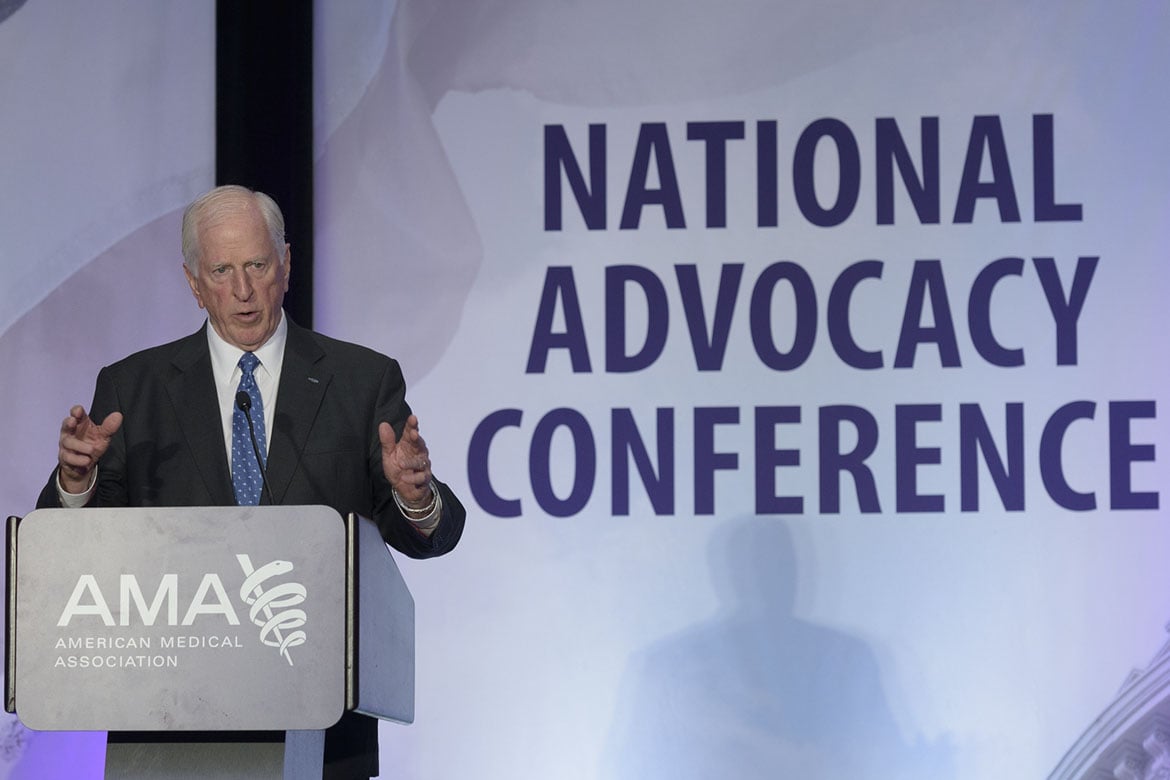Physicians were told that, at minimum, one bill reflecting AMA policy on firearm violence prevention was almost guaranteed to pass at least one chamber of Congress.
Bills need 218 votes to pass the U.S. House of Representatives, and H.R. 8, the Bipartisan Background Checks Act of 2019, has 232 co-sponsors, the bill’s author, U.S. Rep. Mike Thompson, D, Calif., told physicians at the AMA National Advocacy Conference in Washington, D.C.
He added that physicians have helped build this coalition, which includes Rep. Pete King, R, N.Y., as the primary GOP co-sponsor of the bill.
“I can’t tell you how helpful your support is,” Thompson said. “You’ve been fabulous.”
But the real work begins when the bill goes to the Senate, Thompson said, adding that, what will be needed, is for every U.S. Senator to hear from “every doc, and every doc’s family, and every doc’s friend, and every doc’s assistant” to raise the heat on the issue of background checks.
While the political climate may indicate passage in the Republican-controlled Senate could be difficult, AMA Board of Trustees Chair Jack Resneck Jr., MD, cited polls that said most Americans—even gun owners and National Rifle Association members—support background checks.
The House Judiciary Committee voted 23-15 on Feb. 13 to pass the bill.
Background checks conducted through the National Instant Criminal Background Check System (NICS) resulted in 112,000 individuals being denied a firearm in fiscal 2017, according to the U.S. General Accountability Office report.
Policy calling for strengthening the NICS was adopted at the 2018 AMA Interim Meeting.
Dr. Resneck also noted the AMA’s position that firearm violence is a public health issue. He summarized AMA policies adopted in recent years that call for background checks, a ban on assault weapons, and other commonsense measures that are not intended to infringe on citizens’ Second Amendment rights but meant to keep guns out of the hands of those who would cause harm.
Licensed firearm dealers are required to conduct background checks, but private transactions are not subject to these regulations and there can be deadly consequences. Thompson cited the instance in Wisconsin where a man prohibited from possessing a firearm by a state court domestic-violence injunction was able to obtain one through a listing on the Armslist website.
The transaction took place in the parking lot of a fast food restaurant, and Radcliffe Haughton used the gun to kill his wife and two other women before taking his own life in 2012.
The daughter of woman who was killed with that gun is suing the website. The AMA and Wisconsin Medical Society filed an amicus brief supporting her with the Wisconsin Supreme Court, which is hearing the case this month.
Physicians have come under some criticism for getting involved in firearm violence issues and have been told to “stay in their lane.” But, in her opening remarks at the conference, AMA President Barbara L. McAneny, MD, echoed the physician grassroots rallying cry and declared “This is our lane.”
She called for commonsense measures such as background checks on all firearm purchases and epidemiological studies on gun violence to be conducted by the Centers for Disease Control and Prevention.
Thompson noted that conducting such research should have bipartisan support.
“Research should be a non-threatening thing,” he said. “Everyone should want to know what the facts are.”




